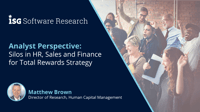Compensation data is everywhere. Internal equity metrics, market benchmarks, performance history, pay transparency requirements—there’s no shortage of data coming in from every direction. But volume does not always guarantee clarity. It is not about the data your system can collect, it is about whether that system—and the people behind it—can turn the data into decisions that actually make sense. That is what it means for your compensation tech to speak the right language.
Read More
Topics:
Human Capital Management,
Total Compensation Management,
Employees & HCM - Business & Technologies
Frontline work is being reshaped from every direction: tighter labor pools, unpredictable demand and a workforce that expects more than just a paycheck. Yet too many organizations are still treating workforce scheduling like a game of Tetris—moving blocks around and hoping they fit. It’s time to admit that smart scheduling isn’t just a nice-to-have—it’s a frontline imperative. And if the enterprise is still thinking of it as “just logistics,” it's already falling behind.
Read More
Topics:
Human Capital Management,
Employee Engagement,
Workforce Management,
Employees & HCM - Business & Technologies
The learning management system (LMS) market is evolving, with the lines that once rigidly defined categories becoming increasingly blurred. Today, an LMS that lacks Learning Experience Platform (LXP) capabilities risks becoming obsolete in an environment where user expectations are shifting rapidly. In a similar vein, an LMS and LXP that fail to harness the power of artificial intelligence (AI) to guide learners through their diverse learning journeys face a similar fate.
Read More
Topics:
Human Capital Management,
Employee Engagement,
Learning Management,
Employees & HCM - Business & Technologies
I recently attended the Oracle Apps & Industry Analyst Summit in Redwood City, California. Over the course of two days, Oracle offered a concentrated look at a market that is both racing ahead and tripping over its own shoelaces. Generative, predictive and now agentic artificial intelligence (AI) have become the new currency of competitive advantage across HCM; Oracle alone has delivered more than 150 AI capabilities across its Fusion Apps and 62 inside HCM in just two years, climbing from...
Read More
Topics:
Human Capital Management,
Employee Engagement,
Learning Management,
Talent Management,
Workforce Management,
Payroll Management,
Total Compensation Management,
Employees & HCM - Business & Technologies
For decades, organizations have treated sales incentive compensation as a separate entity, isolated from the broader total rewards strategy. This isolation stems from historical operations, where sales compensation is designed and managed within Sales, with periodic budget oversight from Finance, while HR focuses on base pay, benefits and equity. Unfortunately, this siloed approach, further reinforced by outdated technology and entrenched business practices, limits companies from fully...
Read More
Topics:
HCM,
Human Capital Management,
Business,
Total Compensation Management
Turnover rates have taken center stage in workforce discussions, often being the first metric leaders request when assessing the state of the workforce. Yet, in isolation, turnover is one of the least understood indicators we have. Relying solely on turnover is like driving a vehicle using only your side and rearview mirrors; you’re reacting to what has already happened, without a clear view of what lies ahead. While turnover shows us that employees are leaving, it doesn’t reveal why they’re...
Read More
Topics:
Human Capital Management,
Learning Management,
Talent Management,
Workforce Management,
Payroll Management,
Total Compensation Management,
employee experience
HR software for HCM is supposed to be the great enabler of a better employee experience. It promises to streamline processes, create seamless engagement and elevate the workplace into something dynamic, personalized and intuitive. Yet, for many organizations, the reality is far from the promise. Instead of making work better, HR software often becomes a tangled web of disconnected tools, frustrating interfaces and rigid automation that strip away the human element. As we progress through 2025,...
Read More
Topics:
Human Capital Management,
Learning Management,
Talent Management,
Workforce Management,
Payroll Management,
Total Compensation Management,
employee experience
For years, HR technology has been seen primarily as an administrative tool—handling records, payroll and compliance. But what if its real power lies in shaping workforce strategy, building community and driving transformation?
Read More
Topics:
HCM,
HCM Suites
Workforce planning has long been a cornerstone of business strategy, yet many enterprises still approach it with outdated methods. Traditionally, it has been rigid, reactive, subjective and often siloed. But as industries evolve—especially those with high turnover and a large frontline workforce, like retail, healthcare and hospitality—companies must rethink how they forecast talent needs. Technology is reshaping workforce planning, making it more dynamic, precise and forward-thinking.
Read More
Topics:
HCM,
Human Capital Management,
Employee Engagement,
Learning Management,
Talent Management,
Workforce Management,
Total Compensation Management
Attending isolved’s first Analyst Summit was more than just an opportunity to hear about their latest innovations—it was a front-row seat to their vision for the future of HR technology and services. A central theme emerged quickly—they are deeply committed to supporting small and mid-sized businesses (SMBs), not just with technology but also with robust services and an ecosystem of partners that elevate HR teams into the strategic powerhouses they were always meant to be.
Read More
Topics:
Human Capital Management,
Employee Engagement,
Learning Management,
Talent Management,
Workforce Management,
Payroll Management,
Total Compensation Management




















